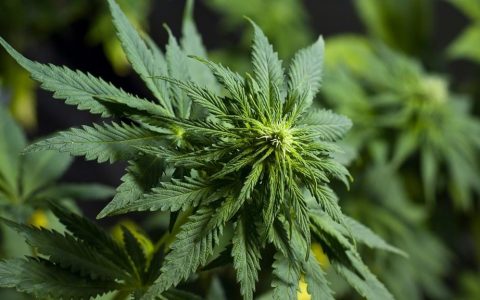Jay Leno drives a car made out of cannabis
On Wednesday's episode of "Jay Leno's Garage," retired Dell executive Bruce Dietzen sells the host on his unconventional 2017 Renew, a car that was designed with the environment in mind. It was "carbon neutral" to produce and made from woven cannabis hemp.
Manufacturing the average car emits about ten tons of carbon dioxide into the atmosphere. "That's before it even hits the road," notes Leno, where it will release another six tons a year.
It's also ten times stronger than steel. Dietzen demonstrates by banging repeatedly on the hemp-based hood. Leno gives it a go, too, using an impressive amount of force for someone who dislocated his shoulder in the last episode.
When the two decide to hop in the car for a test drive, Leno jokes, "Maybe we'll hit a couple of cars and see what happens. Then we'll really see how strong it is."
But, at least in front of the cameras, everything runs smoothly.
Dietzen can't take all the credit for the idea. In fact, Henry Ford manufactured the original hemp car all the way back in 1941. The father of the Model T was an advocate for both producing and fueling cars entirely with plant material.
Dietzen does not specify what the Renew runs on in the episode, but he has made strides to produce carbon-negative substances in the past. In 2016, the Miami Herald reported that he had been collaborating with the Colorado-based tech company Cool Planet to create a more sustainable type of fuel.

CNBC | Getty Images
Jay Leno with Bruce Dietzen's 2017 Renew on CNBC's "Jay Leno's Garage"
Though in many ways more practical and eco-conscious than the average car, the Renew's hemp structure has some downsides. For one, it does not always attract respect. "It's kind of a double edged sword" says Leno. "The marijuana connection garners the interest, but then people don't take you seriously."
Dietzen nods his head in agreement and points out that, contrary to popular opinion, not all forms of cannabis are psychoactive. "You could smoke all the hemp you could want," he tells Leno, "and you won't get high."
And despite what many tend to assume, Dietzen confirms he doesn't smoke the stuff at all. "Believe it or not," jokes Leno, "Bruce was not high when he invested $200,000 to build this prototype."
"No one said investing in the future is going to be cheap," he adds.
The standard model only costs $40,000, though. So maybe the future is in your price range.
There are some additional videos in the article that I couldn't embed. If you are interested, just hit the link in the title.
On Wednesday's episode of "Jay Leno's Garage," retired Dell executive Bruce Dietzen sells the host on his unconventional 2017 Renew, a car that was designed with the environment in mind. It was "carbon neutral" to produce and made from woven cannabis hemp.
Manufacturing the average car emits about ten tons of carbon dioxide into the atmosphere. "That's before it even hits the road," notes Leno, where it will release another six tons a year.
It's also ten times stronger than steel. Dietzen demonstrates by banging repeatedly on the hemp-based hood. Leno gives it a go, too, using an impressive amount of force for someone who dislocated his shoulder in the last episode.
When the two decide to hop in the car for a test drive, Leno jokes, "Maybe we'll hit a couple of cars and see what happens. Then we'll really see how strong it is."
But, at least in front of the cameras, everything runs smoothly.
Dietzen can't take all the credit for the idea. In fact, Henry Ford manufactured the original hemp car all the way back in 1941. The father of the Model T was an advocate for both producing and fueling cars entirely with plant material.
Dietzen does not specify what the Renew runs on in the episode, but he has made strides to produce carbon-negative substances in the past. In 2016, the Miami Herald reported that he had been collaborating with the Colorado-based tech company Cool Planet to create a more sustainable type of fuel.

CNBC | Getty Images
Jay Leno with Bruce Dietzen's 2017 Renew on CNBC's "Jay Leno's Garage"
Though in many ways more practical and eco-conscious than the average car, the Renew's hemp structure has some downsides. For one, it does not always attract respect. "It's kind of a double edged sword" says Leno. "The marijuana connection garners the interest, but then people don't take you seriously."
Dietzen nods his head in agreement and points out that, contrary to popular opinion, not all forms of cannabis are psychoactive. "You could smoke all the hemp you could want," he tells Leno, "and you won't get high."
And despite what many tend to assume, Dietzen confirms he doesn't smoke the stuff at all. "Believe it or not," jokes Leno, "Bruce was not high when he invested $200,000 to build this prototype."
"No one said investing in the future is going to be cheap," he adds.
The standard model only costs $40,000, though. So maybe the future is in your price range.
There are some additional videos in the article that I couldn't embed. If you are interested, just hit the link in the title.







